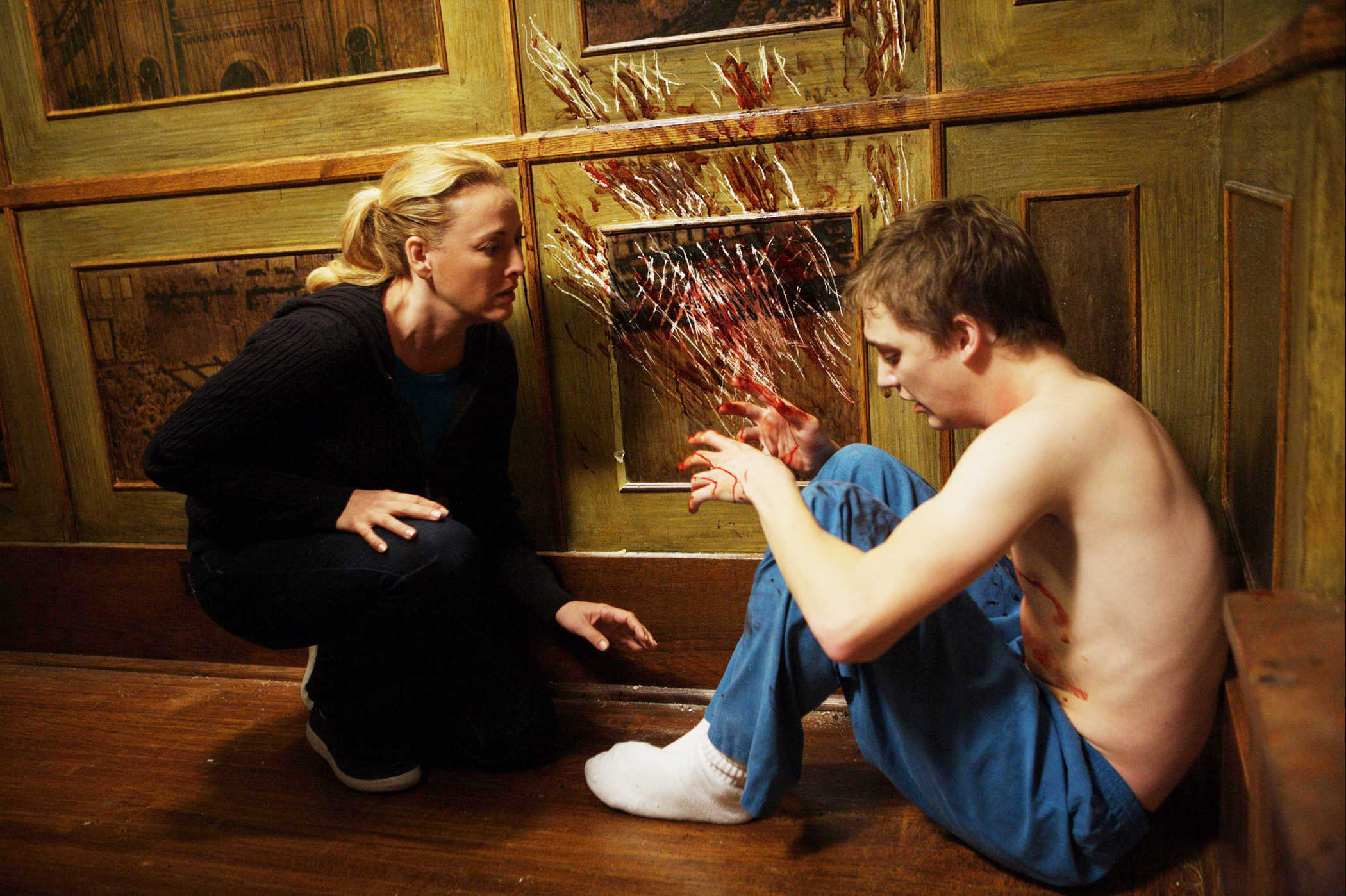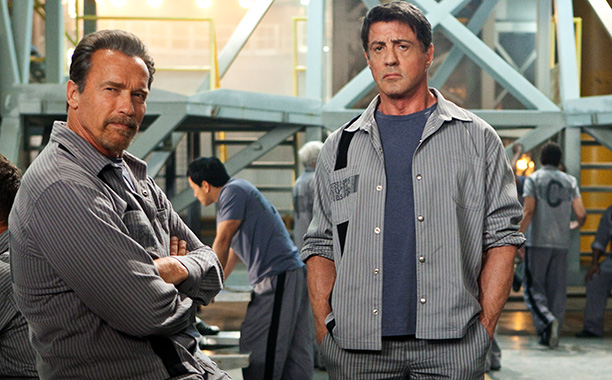Wednesday, 30 October 2013
1,001 Films: "Playtime" (1967)
Singular comic vision, or folie de grandeur? Playtime, Jacques Tati's spin on the Man with a Movie Camera-style portrait of a city, wordless and as studiously designed as The Fountainhead, amounts to the director-star (in Hulot garb) stumbling around an office block, into a trade fair (selling brooms with headlights on them for nocturnal cleaning, and flip-top bins in the Doric style) and then back out into the night. It's not so much modernist or futurist as diagonalist: the whole movie's obtuse, at an angle, a "sideways look" at the consumerist world - and we should note at this point that the words "sideways look" don't guarantee laughs, and that Tati's methods here are such that it is very, very easy to get lost in the film's grand design.
From this writer's perspective, Playtime is almost funny, and the reason for that "almost" is that too much thought has been applied to what might make the film funny: this blueprint-like comedy has been relentlessly refined, streamlined to the point where what was originally amusing or incongruous about any given scene or moment no longer entirely exists. This is a film full of "things that happen" rather than jokes per se - a baggage label fluttering uncontrollably, a commuter accidentally grabbing a lampshade rather than a bus's pole - and yet it also seems one of the least eventful comedies of all time, arriving entirely without plot: if what stand-up comics refer to as observational comedy is the translation of images into words, Tati seems determined to convert those words back into images, and because of the way he crams the back and sides of the frame, you will need to see Playtime on a big screen for these "jokes", such as they are, to stand even the slightest chance of working. Baffling for me, apparently hilarious for others: truly, comedy has never been so subjective.
Playtime is available on DVD through the BFI.
Tuesday, 29 October 2013
From the archive: "The Haunting in Connecticut"
It's been a duff season for horror. We've been beset by pointlessness (Friday the 13th, My Bloody Valentine), pretension (The Broken), more sadism (Martyrs); perhaps it's no surprise that the horror movie critics and audiences have best responded to (Let the Right One In) is the one that barely functions as such. Audiences have shown greater faith in Peter Cornwell's The Haunting in Connecticut than the film's distributors (who hustled it into cinemas without a press screening), and there may be more than a little relief in their response to a film that earns its creeps and scares the old-fashioned way, with a modicum of patience and - yes - even craft. Virginia Madsen and Martin Donovan move their brood to a suspiciously innocuous suburban pile to be closer to the hospital at which their eldest (Kyle Gallner) is receiving treatment for cancer. Soon, said son is seeing floors awash with blood, and nefarious activity behind the frosted glass of a locked door; of course, it could just be his meds.
Though Cornwell makes use of some of the gimcrack sound-and-editing effects that marked 2005's The Exorcism of Emily Rose, the last post-Exorcist chiller to use science and religion to give some credibility to a study of (allegedly true-life) unexplained phenomena, the screenplay - co-authored by horror scholar Adam Simon - does something unusual and smart in linking its supernatural terrors to the feelings of pain and helplessness that must follow from suffering a terminal illness, or watching a loved one die. Muted, unhurried, and - for all its scuttling bugs and crabs - admirably low-key, it's also performed with a welcome degree of sincerity: Madsen (refining her now-stock over-burdened mom role) and Donovan (succumbing to the devil of a drink inside him) make a very handsome couple, and Gallner is a rare screen sufferer to actually look sickly beneath his brave smiles. Nothing too remarkable, but decently assembled and satisfying in its storytelling, offering both rational and religiose explanations for most of its mysteries.
(April 2009)
The Haunting in Connecticut is available on DVD through Entertainment in Video; a sequel, The Haunting in Connecticut 2: The Ghosts of Georgia, opens in cinemas nationwide this Thursday.
Saturday, 26 October 2013
For what it's worth...
Top Ten Films at the UK Box Office
for the weekend of October 18-20, 2013:
1 (new) Turbo (U) [above]
2 (new) Captain Phillips (12A) ****
3 (new) Escape Plan (15) **
4 (1) Prisoners (15)
5 (2) Sunshine on Leith (12A)
6 (3) Blue Jasmine (12A) **
7 (4) Filth (18) ***
8 (5) Rush (15) **
9 (new) Boss (12A)
10 (7) Le Week-End (15) ***
(source: Guardian.co.uk)
My top five:
1. Wolf Children
2. Prince Avalanche
3. Captain Phillips
4. The Epic of Everest
5. The Pervert's Guide to Ideology
Top Ten DVD rentals:
1 (new) Jack the Giant Slayer (12) **
2 (new) Identity Thief (12) *
3 (5) Iron Man 3 (12) ***
4 (4) Cloud Atlas (15) ****
5 (3) Olympus Has Fallen (15) ***
6 (1) Star Trek: Into Darkness (12) ***
7 (2) Mud (12) ***
8 (6) Lincoln (12) ****
9 (re) A Good Day to Die Hard (12)
10 (8) Zero Dark Thirty (15) ***
(source: lovefilm.com)
My top five:
1. Before Midnight
2. We Steal Secrets: The Story of Wikileaks
3. Renoir
4. Like Someone in Love
5. The Pervert's Guide to Ideology
Top five films on terrestrial TV this week:
1. The Thirty-Nine Steps (Sunday, BBC2, 7.05am)
2. TT: Closer to the Edge (Friday, ITV1, 10.35pm)
3. Ghost Busters (Sunday, five, 6.55pm)
4. Cloudy with a Chance of Meatballs (Sunday, five, 12noon)
5. Monster House (Sunday, five, 5.15pm)
Friday, 25 October 2013
"Cloudy with a Chance of Meatballs 2" (The Guardian 25/10/13)
Cloudy with a Chance of Meatballs 2 (U) 95 mins ***
Obligation rivals
inspiration in this passable sequel to 2009’s appreciably zappy gastro-themed digimation. There’s a smart, satirical idea in having wayward inventor hero
Flint Lockwood (voiced by Bill Hader) picked up by West Coast ideas hub
LiveCorp, a suspiciously shiny consortium of blue-sky, out-of-the-box thinkers
– it’s just a pity it’s only there to launch the kind of episodic quest that
now sustains our lazier half-term timekillers. Fortunately, the animators get
stuck in: the foodscape Flint’s party passes through is again wittily realised,
each frame sprinkled with colourful hybrid creations, from “flamangos” to “shrimpanzees”.
If one misses the original’s emotional throughline, the bubbling fondue of
sight gags and dad jokes (“How’d ya make a gorilla stew?”) does enough to keep
you smiling, and – sorry, parents – any merchandise pertaining to the too-cute
sentient strawberry known as Barry is going to be high on your shopping list
this Christmas.
Cloudy with a Chance of Meatballs 2 is in cinemas nationwide.
Thursday, 24 October 2013
Baggage claimed: "Enough Said"
What strikes you first about Nicole Holofcener's Enough Said is how purposefully gentle it is. For a romantic comedy, there's no straining for comic effect: like a session on the fold-up massage table carried around by its heroine, this is a subtly probing affair, determined to make you relax into its company - and good company it proves, too. In some ways, Holofcener is simply obliging us to adapt to the pace of the characters populating this second-chance romance: two folks who've been around the block a little, and are now content to take matters as they come, at their own speed. To watch the film is to see how life goes.
With the minimum of fuss, we're introduced to Eva (Julia Louis-Dreyfus), a masseuse, and Albert (James Gandolfini), a television archivist - both in that forty-fifty age bracket, both with a teenage daughter by an earlier marriage. Though they're at ease with themselves, and with one another, the pair have baggage, history - literalised by that massage table, and his profession - which they sometimes feel compelled to tuck away or tidy up: kids that still need attention, gnarly feet, missing teeth, middle-age spread, relationships that didn't work out. One of Eva's clients, the waspy poet Marianne (Catherine Keener), turns out to be Albert's ex, and her on-table griping about her ex comes to warp Eva's perception of her new beau, if indeed Albert can be described as either new or a beau.
It takes a special chemistry to get past these things, of course, and Enough Said will likely go down as one of 2013's few movies to actually benefit from the increasing pre-eminence of television, in this respect. The film permits Louis-Dreyfus a wider showcase for the timing highlighted on Seinfeld and further sharpened by the recent Veep; it also allows Gandolfini to play against established type as a big softie, while demonstrating all the dramatic subtlety fostered over the course of several seasons of The Sopranos. Holofcener, too, has kept herself busy between projects with TV gigs: as with her episodes of the pretty wonderful Enlightened, Enough Said is good at honing in on the minutiae of everyday lives, and the need for connection to lift us out of the crappy ruts we sometimes get stuck in.
I think it's fair to say that Holofcener's strengths lie as a writer and director of actors. Her mise-en-scène isn't notably more widescreen than her TV work; though the interior design is better these days, she's still making the kind of chattily unfussed indie she made with 1996's Walking & Talking. Still, who needs Kubrick when a filmmaker's virtues are so plainly human? Holofcener has always had a cherishable ear for the ways in which men and women think and talk: there may be no greater illustration of the difference between the sexes currently available than the scene in which Eva complains to her best friend Sarah (Toni Collette) about the male client who blithely watches her struggling to cart her table up his front steps, causing Sarah's husband to ask "Did you ask him to help?"
Yet this director has also kept an eye on the longer game, recognising how with age comes balance, tolerance, a reluctance to judge. Her lovers, experienced enough to know the challenges of living a life, are notably more patient and forgiving than their bitchy, snobby offspring; Eva and Albert's mid-film separation will be all the more affecting for seeing two characters we've come to know and care about trying desperately to act like responsible adults, rather than gnashing their teeth and tossing the crockery at one another. Forever taking its cue from its characters, Enough Said remains a gentle massage for the head, heart and tearducts rather than anything more vigorous; yet, whether by Louis-Dreyfus's shows of the nervy, deflective humour common to some women, or by the sight of Gandolfini in his penultimate role, wrapping up all his scenes in an affectionate bearhug, you are touched.
Enough Said is in selected cinemas.
1,001 Films: "Two or Three Things I Know About Her/Deux ou Trois Choses Que Je Sais D'Elle" (1967)
The "her" in the title of Two or Three Things I Know About Her refers to Paris and its environs, which had featured as a character for so long in most Godard films that it deserved the top billing it finally got here. A relationship drama of a sort (in that its chief interest lies in the relationship between objects, ideas and buildings rather than people), it seems designed as much as anything to show off Paris's swish new flyover and dockside developments. But these are just the backdrops against which Godard comes to examine - in meticulous, some might say pedantic detail - the space (i.e. distance) between us, starting with, as in Week-End, the gap between the rate of technological and industrial development and that of the individual.
A succession of skits or tableaux illustrate the difference between what we want to express and what we actually say; between the lives we read and dream about and those we get; between the relationships we desire and those with which we make do; between ourselves and our reflections; even - in the film's most explicitly political strand - between day-to-day events in Paris, where it's clearly business as usual, and what was happening out in Vietnam. "The jeep and the napalm" are cited as two more examples of a misdirected technological development, and - for perhaps the first time in a Godard movie - America starts to manifest itself as the enemy, pitting republique against republic.
It has the most extraordinary sequence in all the director's work, as the camera slowly disappears into the void of a full coffee cup whose contents come to resemble infinity, nothingness, the universe and everything. Yet the film is as noteworthy for the prescience of its ideas as it is for its striking visuals: Godard absolutely foresees post-modernism ("in images, everything goes - the best and the worst") and, indeed, corporate post-modernism (the final shot is of a city constructed entirely of brand names). For once, this director is more interested in what's in other people's heads than simply what's on his own mind - the narration is whispered and hesitant, some distance from the more familiar bombast and hyperbole - but it's an unusually and absurdly modest Godard film: it knows an awful lot more than just a handful of things.
Two or Three Things I Know About Her is available on DVD through Optimum Home Entertainment.
Monday, 21 October 2013
From the archive: "Cloudy with a Chance of Meatballs"
A lot of nondescript, factory-line computer animation passed our way over the summer, so it's perverse that the standout release Cloudy with a Chance of Meatballs - easily Sony Pictures Animation's best since Monster House back in 2006 - should have been held back until after the holidays: parents might want to use it as a treat for little ones who've done their homework early. The tiny island of Swallow Falls - look it up; it's under the "A" in Atlantic Ocean on the map - has fallen into disrepair after the closure of its sardine cannery. Following a run of failures - including a misjudged attempt to crossbreed rats and birds - wild-haired inventor Flint Lockwood (voice: Bill Hader) finally lucks out with a satellite that converts water into food: cue tourism-boosting flurries of cheeseburgers and ice-cream snowdrifts. Soon, the community's been renamed Chew and Swallow Falls - but the "apparently indestructible" dam around Mount Leftovers will only hold so long.
The imagination runs deep here. Secondary characters include a bemulleted sardine mascot, gone to obnoxious flab on his own small-town celebrity, and a hotpants-sporting, Mr. T-voiced cop - he pities the food - whose movements alone justify the now-obligatory grafting on of 3D. Breakthrough writer-directors Phil Lord and Christopher Miller juggle these and other visual flourishes - gelatine haystacks, flying pizza slices - without obscuring the emotional business of Flint reconnecting with his monobrowed fisherman father, or the cautionary message on the perils of unregulated consumption. There are some great gags along the way. Concerned weathergirl/love interest Sam Sparks (Anna Faris): "That spaghetti twister is just an amuse-bouche compared to what's on its way." Crowd gathering behind her: "What's an amuse-bouche?" In its own way, the film itself is.
(September 2009)
Cloudy with a Chance of Meatballs is available on DVD through Sony Pictures Home Entertainment; a sequel opens this Friday.
Saturday, 19 October 2013
At the LFF: "Gloria"
And they say there are no great roles left in cinema for women over a certain age. The Chilean drama Gloria - one of the hits of this year's Berlin festival, directed by Sebastian Lelio and produced by the team behind Post Mortem and NO - is a character study that transcends its initially narrow focus to follow its protagonist into some surprising, compelling places. It opens with scenes from the everyday reality of its eponymous heroine (Paulina Garcia), a fiftysomething divorcee in contemporary Santiago: there are brisk twirls around the city's singles scene, yoga classes and self-help workshops, and negotiations with a son and daughter caught up in lives of their own. Outside of an ongoing dispute with a noisy neighbour, this is - by Gloria's own admission - "a quiet life", but that doesn't mean it doesn't deserve examination, and Lelio acknowledges as much by keeping his camera close to a woman who would ordinarily risk fading into the background.
There's already something admirable about the manner in which the film permits its heroine no false glamour (or, indeed, much vanity): when Garcia takes off her Deirdre Barlow specs and lets down her hair, she still looks like an amenable secretary, or one of the friends your mother might invite over for a coffee morning. Yet where certain directors currently trolling world cinema would treat the prospect of over-50s sex as a horrorshow of wrinkles and erectile dysfunction, Lelio handles Gloria's couplings with low-level paintball mogul Rodolfo (Sergio Hernandez) with the utmost dignity and respect. This pair approach one another with courtesy, and make love with tenderness - which, admittedly, may be no revelation to audiences who've lived through this - and Lelio and writer Gonzalo Maza are genuinely interested in what such a couple might talk about before and after the sex act itself.
By the midpoint, an extended family reunion, Gloria appears to finally have it all: a new man, the company of loved ones, a grandchild on the way. We may, however, note that while the heroine's openness - to new experiences and those around her - leaves her well-placed in some respects, it leaves her vulnerable in many others; this is a rare film to acknowledge the phenomenon by which women in middle age remain receptive to the world, where even those men who weren't hopelessly closed-off to begin with start to shut down in some way. There is, we learn, a third party in this relationship - Rodolfo's mobile phone - and a sticking point emerges in his inability to use it to tell his offspring he has a new girlfriend. Without losing sight of Gloria's needs and desires, Lelio's film allows us to see exactly why Rodolfo does what he does - a stand which will make Gloria one of those awkward date movies that'll only leave couples picking sides and arguing the toss over any post-screening dinner.
It remains quite the ride getting there, all the same: the second half will see our previously mild-mannered heroine start to lose it as her own world appears to close down, such that even a plastic puppet skeleton glimpsed in a shopping precinct comes to assume the heaviest of significances. The close-up approach has pleasing narrative consequences: right up until the closing moments, which feature the most transcendental use of a Laura Branigan song the movies have yet given us, we simply don't know what lies around the corner for Gloria, and what therefore is to become of her. As a result, this is one of the few films I've seen in recent times to only get more involving with every scene - and because it asks its leading lady to at all stage embody all possible consequences and outcomes, it yields the most all-encompassing and multidimensional female performance since Tilda Swinton in 2008's Julia, allowing Garcia in a little under two hours to run the gamut from mousy, warm and sensual to angry, zonked and defiant. She's a keeper; so too is Lelio's remarkable film.
Gloria screens on Sun 20 at 6pm in NFT1, before opening in selected cinemas from November 1.
Friday, 18 October 2013
For what it's worth...
Top Ten Films at the UK Box Office
for the weekend of October 11-13, 2013:
1 (1) Prisoners (15)
2 (3) Sunshine on Leith (12A)
3 (4) Blue Jasmine (12A) **
4 (2) Filth (18) ***
5 (5) Rush (15) **
6 (new) The Fifth Estate (15) **
7 (new) Le Week-End (15) ***
8 (6) Runner Runner (15)
9 (7) Justin and the Knights of Valour (PG)
10 (10) White House Down (12A)
(source: Guardian.co.uk)
My top five:
1. Prince Avalanche
2. Captain Phillips
3. The Epic of Everest
4. The Pervert's Guide to Ideology
5. Enough Said
Top Ten DVD rentals:
1 (new) Jack the Giant Slayer (12) **
2 (new) Identity Thief (12) *
3 (5) Iron Man 3 (12) ***
4 (4) Cloud Atlas (15) ****
5 (3) Olympus Has Fallen (15) ***
6 (1) Star Trek: Into Darkness (12) ***
7 (2) Mud (12) ***
8 (6) Lincoln (12) ****
9 (re) A Good Day to Die Hard (12)
10 (8) Zero Dark Thirty (15) ***
(source: lovefilm.com)
My top five:
1. We Steal Secrets: The Story of Wikileaks
2. Renoir
3. Like Someone in Love
4. The Pervert's Guide to Ideology
5. More Than Honey
Top five films on terrestrial TV this week:
1. The Lady Vanishes [above] (Saturday, BBC2, 8.35am)
2. Die Hard (Saturday, C4, 9pm)
3. Halloween: H20 (Friday, BBC1, 11.50pm)
4. The African Queen (Wednesday, C4, 1.05pm)
5. Leaving (Saturday, BBC2, 12.55am)
"Last Passenger" (The Guardian 18/10/13)
Last Passenger (15) 97 mins ***
The British action movie
remains a rare beast – understandably so, if you recall 1997’s Downtime, which attempted to emulate Die Hard in a tower block with an
asthmatic Paul McGann. The genre may get a boost from writer-director Omid
Nooshin’s enjoyably crafty, neo-Hitchcockian debut, set aboard a midnight
commuter train. Dougray Scott is the medic trying to return his son to Sevenoaks
when the guard disappears and the driver – whose death drive is left chillingly
motiveless – speeds through Tunbridge Wells, with no terminus in sight save,
perhaps, the English Channel. It takes a judicious while to introduce Scott’s
ambiguous fellow travellers, yet even when the pace accelerates, Nooshin holds
onto a strain of logic that doesn’t often survive at this level of filmmaking:
if you’ve ever wondered what goes on inside a driver’s cab, or glimpsed
something indecipherable through a rain-spattered carriage window, it should
just work.
Last Passenger opens in selected cinemas from today.
"The Broken Circle Breakdown" (The Guardian 18/10/13)
The Broken Circle Breakdown (15) 111 mins ***
Advance word on this
Flemish tearjerker was formidable, but I’m afraid I couldn’t quite see past the
oddness of its conceit: to redo Blue Valentine with songs. Felix van Groeningen’s film at least justifies its
title’s eccentricity: the relationship between a beardy bluegrass singer (Johan
Heldenbergh) and a tattooed free spirit (Veerle Baetens) is set out as
fragments of life before and after the death of their young child, scrapbooking
nudey frolics alongside heavily-worn regret. The music lends it whatever unity
it has: though there’s a certain comic incongruity in the idea of all this
banjo-plucking going down in Northern Europe – the spirit of Rednex lingers –
it’s chiefly regarded as a fleeting source of solace. The leads emote their
hearts out, and it’ll doubtless make a resonant soundtrack album – but van
Groeningen needs those tunes to carry us over his somewhat contrived and flatpack-like
vision of bohemia.
The Broken Circle Breakdown opens in selected cinemas from today.
"The Lebanese Rocket Society" (The Guardian 18/10/13)
The Lebanese Rocket Society (uncertificated) 93 mins **
Lebanon’s modest
contribution to the Sixties space race – the society formed at Beirut’s
Haigazian University by Professor Manoug Manougian – is here reclaimed as a
source of optimism: it encouraged students from across the Middle East to fire
rockets skywards, rather than at each other. Yet this dour-seeming documentary
only succeeds in framing the Society’s efforts as so much elaborate tinkering –
a science-fair project that briefly caught eyes before being consigned to
history’s attic. The flat-footed investigative approach, shuffling between
archives, hardly helps; only with a belated attempt to reconstruct the rockets
does the film poke its head beyond the shed door.
The Lebanese Rocket Society opens in selected cinemas from today.
"Escape Plan" (The Guardian 18/10/13)
Escape Plan (15) 116 mins **
What’s the most
preposterous aspect of this not-so-great escape: that Sly Stallone should be
playing the brains behind the weighty tome “Compromising Correctional
Institution Security”? That he should blithely accept Government coin to test
the perimeters of an off-the-grid panopticon where Vinnie Jones commands
greater authority than Sam Neill? Or simply that he’s then obliged to accept
the protection of Austrian anarchist Arnold Schwarzenegger? (A brawnily tender
shower scene may have hit the cutting-room floor.) Director Mikael Håfström
clears some space for his hotchpotch cast, and delivers one smartly concealed
twist, but he’s stuck with increasingly ropey material, and the problem of
setting semi-crucial structural talk in mouths that haven’t formed a coherent
sentence for decades. It’s basically Prison
Break for dopes, and – in everything from the prisoners’ jumpsuits to the
streaks in Arnie’s hair – decidedly grey pulp, never quite distinctive enough
to merit anything more than a tardy, generally unmemorable DVD viewing.
Escape Plan is in cinemas nationwide.
Thursday, 17 October 2013
At the LFF: "Gone Too Far!"
1993 saw the release of Gurinder Chadha's Bhaji on the Beach, one of those well-intentioned crowdpleasers that wasn't ever likely to take the BAFTAs by storm, but was evidently the start of something noteworthy, not least for Chadha's career; in the two decades since, henna and sag aloo have become staple ingredients of British cinema - and, beyond that, British life. Gone Too Far!, the Peckham-set debut of Anglo-Nigerian director Destiny Ekaragha, gives off much the same vibe: adapted from Bola Agbaje's Olivier Award-winning stageplay, it uses the odyssey of a would-be playa forced to babysit an embarrassing older brother from Nigeria as a way of shirttailing a particular conversation playing out on the streets of the inner city.
Though all skin colours are represented, this isn't quite the same territory as Kidulthood, and not so very far from the Peckham of Del Boy and co. The humour is broad - characters are chased by dogs, and walk blindly into lampposts - yet often disarming: one bad boy knocks an old dear off the pavement with his bike at one point, only to then go back and give her a hug. The big difference between this and the more earnest Bhaji is that the talk Ekaragha's camera overhears clearly comes from the end of a conversation, and not the beginning. Though these characters endlessly debate racial distinctions ("even my mum calls me black, and I'm white"), they almost always find themselves with more pressing matters to be getting on with, whether nipping to the shop on an errand, trying to get laid, or - in one particularly lovely image, carefully positioned at the heart of the film - rollerskating with friends: white, black, whatever.
It's undeniably episodic in form, and that it's pitched chiefly at a home crowd is evident from the decision to preserve Agbaje's patois-heavy dialogue more or less intact and without subtitles, but much of it does feel fresh (there's no Adam Deacon, which is a start), and its unabashed, front-and-centre enthusiasm - its sense of look, we're making a film! - is both infectious and gets it most of the way to the finish line. In twenty years, I predict okra will play more of a role in British cinema than it presently does - and we'll have Agbaje and Ekaragha to thank for it.
Gone Too Far! screens at the Odeon West End tomorrow (Fri 18), the Hackney Picturehouse on Saturday, and the Vue West End on Sunday; ticket details can be found here.
For what it's worth...
Top Ten Films at the UK Box Office
for the weekend of October 4-6, 2013:
1 (1) Prisoners (15)
2 (new) Filth (18) ***
3 (new) Sunshine on Leith (12A)
4 (3) Blue Jasmine (12A) **
5 (2) Rush (15) **
6 (4) Runner Runner (15)
7 (8) Justin and the Knights of Valour (PG)
8 (5) Insidious: Chapter 2 (15) ***
9 (6) About Time (12A) **
10 (7) White House Down (12A)
(source: Guardian.co.uk)
My top five:
1. The Pervert's Guide to Ideology
2. Le Week-End
3. Nobody's Daughter Haewon
4. Filth
5. Folie à Deux
Top Ten DVD rentals:
1 (new) Jack the Giant Slayer (12) **
2 (new) Identity Thief (12) *
3 (5) Iron Man 3 (12) ***
4 (4) Cloud Atlas (15) ****
5 (3) Olympus Has Fallen (15) ***
6 (1) Star Trek: Into Darkness (12) ***
7 (2) Mud (12) ***
8 (6) Lincoln (12) ****
9 (re) A Good Day to Die Hard (12)
10 (8) Zero Dark Thirty (15) ***
(source: lovefilm.com)
My top five:
1. We Steal Secrets: The Story of Wikileaks
2. Like Someone in Love
3. The Pervert's Guide to Ideology
4. Pieta
5. Behind the Candelabra
Top five films on terrestrial TV this week:
1. A Fistful of Dollars [above] (Saturday, five, 9pm)
2. Point Blank (Friday, BBC2, 12.10am)
3. Senna (Sunday, ITV1, 10.20pm)
4. Shane (Monday, C4, 12.50pm)
5. No Way Out (Wednesday, BBC1, 11.45pm)
Subscribe to:
Comments (Atom)














